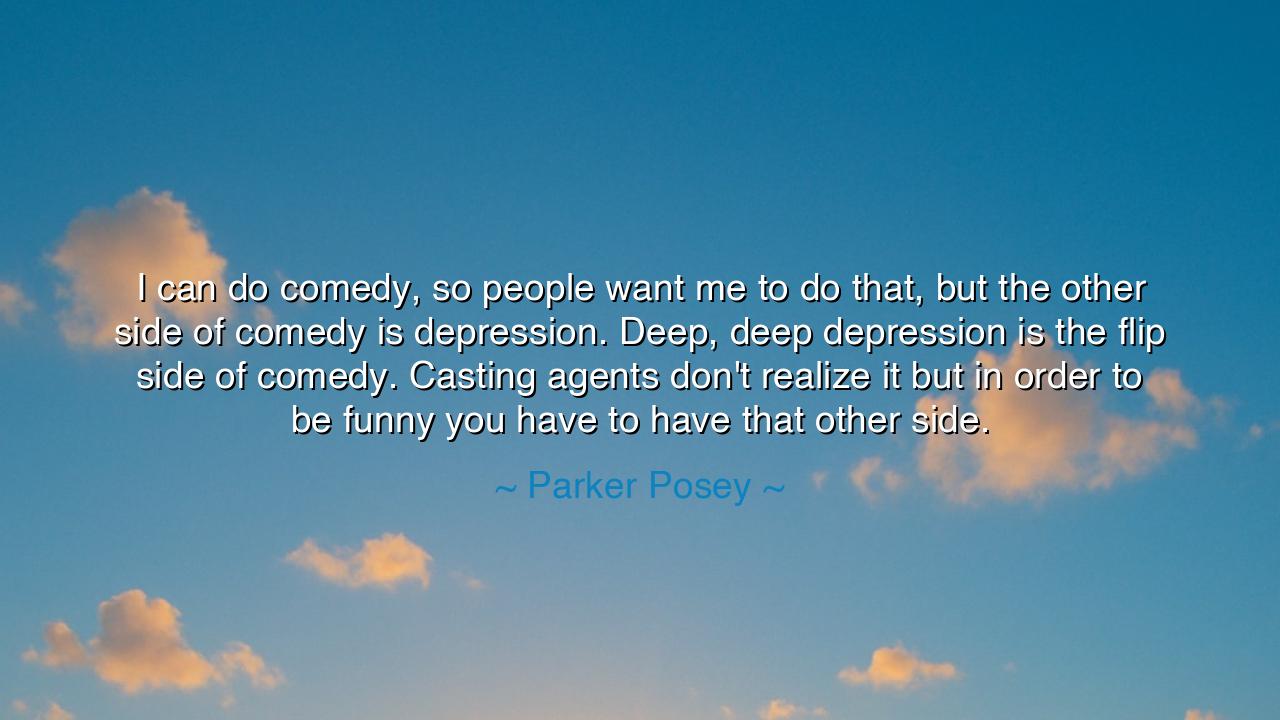
I can do comedy, so people want me to do that, but the other side
I can do comedy, so people want me to do that, but the other side of comedy is depression. Deep, deep depression is the flip side of comedy. Casting agents don't realize it but in order to be funny you have to have that other side.






Hear now, O seekers of understanding, the words of Parker Posey, the queen of wit and subtle melancholy, who once said: “I can do comedy, so people want me to do that, but the other side of comedy is depression. Deep, deep depression is the flip side of comedy. Casting agents don’t realize it but in order to be funny you have to have that other side.” Though her words are simple in form, they strike at the heart of a great and ancient paradox—the union of joy and sorrow, of laughter born from pain, of light that can exist only because it knows the dark.
For in this reflection, Posey speaks the truth that has haunted jesters, poets, and artists since the dawn of creation: that humor, in its purest form, does not come from ignorance of suffering, but from an intimate knowledge of it. The laughter that heals is not shallow; it is carved from the depths of despair. Only those who have felt the weight of existence can lift it for others, even for a moment. Thus, when Posey says that comedy’s opposite is depression, she does not speak of contradiction, but of balance. One is the shadow of the other, and the artist who carries both walks the narrow path between heartbreak and hope.
This truth was known to the ancients. The Greek playwright Aristophanes, master of comedy, lived in a city often torn by war and political chaos. Yet through laughter, he revealed the follies of men and the madness of the powerful. His comedies were not escapism; they were medicine. But how could he write so sharply about the absurdity of life without first feeling its despair? So too with Posey, and all those who create laughter—they do not mock life’s pain from afar; they transform it from within. The comedian, then, is not merely a performer of jokes, but a priest of paradox, channeling suffering into joy so that others may find comfort.
The connection between comedy and depression is as old as art itself. Consider the tale of Robin Williams, the great modern jester whose laughter lit the world, even as shadows gathered in his own heart. His brilliance on screen, his boundless energy, his ability to make others feel alive—all were born from an awareness of life’s fragility. Like Posey, he understood that laughter and sorrow are not enemies, but companions. To laugh deeply is to affirm that even in pain, life still has meaning; to cry deeply is to honor that same truth from another side. Both are acts of courage in a world that often fears both.
When Posey speaks of “casting agents” who see only one side, she laments how the world prizes laughter but forgets its price. Society loves the comedian’s brightness, but rarely understands the darkness that fuels it. Those who live to make others smile often bear the burden of their own unspoken grief. It is a quiet and noble form of service—to turn inward wounds into outward joy. In this sense, comedy is compassion: the laughter of one who has suffered enough to recognize another’s pain and still chooses to heal it through mirth.
Her words also remind us that true art, in any form, must embrace both light and shadow. The human soul is not one-dimensional; it is a tapestry woven of contrasts—pain and pleasure, fear and faith, despair and laughter. To deny one half is to rob the other of depth. Just as a musician needs silence to give meaning to sound, so does the comedian need sorrow to give truth to laughter. Without that duality, humor becomes hollow, a mask without a face behind it. But when both exist together, comedy becomes not performance, but revelation—proof that the spirit can endure.
Therefore, my children of joy and sorrow, let Parker Posey’s words be a reminder to you: do not flee from your sadness, for it may one day become the root of your laughter. Do not despise the shadows in your heart; they are the ink from which your light will be written. If you create, create with all of yourself—the tears as well as the smiles. And when you laugh, let it not be a denial of pain, but a victory over it. For laughter that rises from the dark is the truest kind—the laughter of resurrection, the laughter of one who has fallen, and still stands.
So remember: in the heart of the comedian dwells both the fool and the philosopher, the clown and the healer. When you see another make you laugh, honor them—for they are bearing the weight of two worlds: the visible joy, and the invisible sorrow that sustains it. And when your own heart feels heavy, remember that from such depth springs the laughter that redeems. For as Parker Posey teaches, the art of being funny is not the denial of pain, but its transformation into grace.






AAdministratorAdministrator
Welcome, honored guests. Please leave a comment, we will respond soon